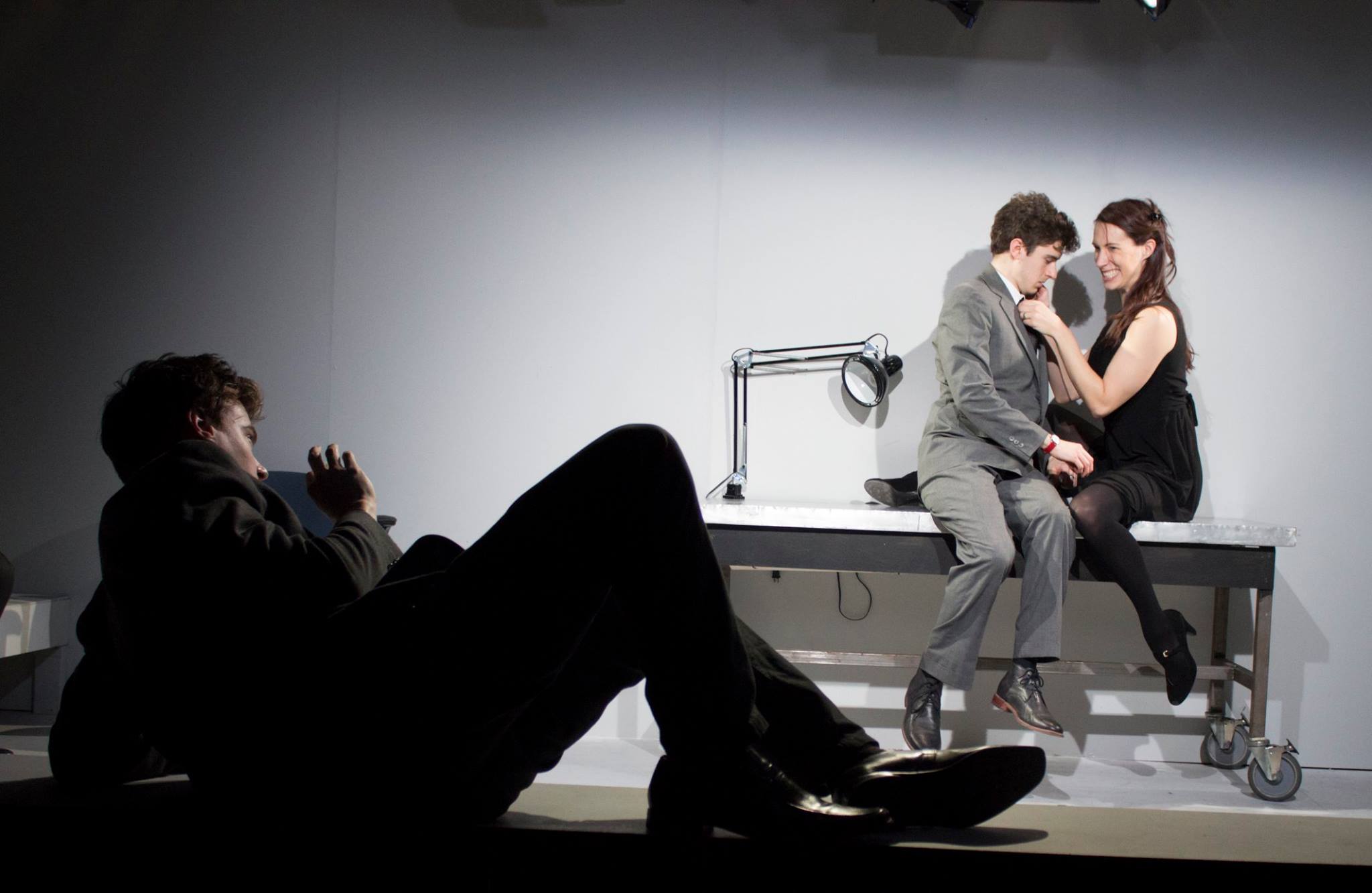Review of Mud, Yale Cabaret
María Irene Fornés’ Mud, now at the Yale Cabaret, directed by third-year actor Patrick Madden, has the compression of a parable, with scenic shifts reminiscent of Beckett’s knife-edge comedies. The play charts a progress of debility, with, in this production, a mix of wryness and weirdness. It’s haunting theater and that’s in part due to a careful creation of atmosphere, with scenic design by Gerardo Díaz Sánchez, lighting by Emma Deane, sound design and music by Frederick Kennedy and Liam Bellman-Sharpe, and spare but well-designed costumes by Sarah Woodham. The play takes place in a space of intense confrontation and supplication, with key freezes that seem hieratic.
Much hinges on Danielle Chaves’ performance as Mae, a woman of no means whose job is pressing clothes—on the kitchen table, the main prop of the set—while tending to Lloyd (Devin White), a slouch of man who has taken sick. Though there’s enough realism to suggest depths of rural poverty and ignorance, the prevailing tone has nothing to do with social reform and everything to do with whatever, we imagine, separates the human from the animal.
Lloyd (Devin White), Mae (Danielle Chaves)
And that’s why Mae is so key. If she’s played as a naïf or a struggling woman seeking to better herself, we move into a different realm. Chaves plays her with a steely self-possession, letting us see that, regardless of her circumstances, her will drives the play. Her trajectory takes her from care-giver to desirer to object of desire to—well, I don’t want to give it away. Suffice to say, she leads us to the heart of what Fornés shows to be the basic stuff of life. And it is to this production’s credit that the final image is debased, brutal, sad, and quite beautiful.
The play begins with Mae cajoling Lloyd to seek out a doctor, as they discuss his impotence as one of his disease’s symptoms. We might suspect that the disease is a symptom of a greater dysfunction between the sexes, particularly when Lloyd insists he is able to ejaculate on his own. It’s an exchange that is both funny in its directness and appalling in its unvarnished crudity. The exchange recalls Godot’s joke about death by hanging being worth it for the ejaculation, but in terms of a general condition. Lloyd is a “poor, forked creature,” reduced to sexual mechanism.
When Lloyd does at last get a pamphlet describing his condition, Mae can’t understand it and brings in a more educated man, Henry (Brandon E. Burton) to read it to them, with what becomes an echo of Lucky pontificating for the benefit of Vladimir and Estragon. It all falls on deaf ears, but Mae falls in love with Henry’s brain and so he is invited to stay. The new configuration reduces Lloyd to the role of a family pet as he sleeps beneath the table with Henry enjoying his bed.
Mae (Danielle Chaves), Lloyd (Devin White), Henry (Brandon E. Burton)
Mae’s pitch to Henry shows her as sexual mechanism dressed in an appeal to Henry’s pride in himself. There are many such moments—another is when Mae’s reading from a textbook about starfish angers Lloyd, and another is when Henry queries Mae about her relation to Lloyd and receives a tale about her father, a foundling, and a relation between Mae and Lloyd that is almost incestuous but which she likens to animals mating.
Lloyd gets his own back when Henry suffers a fall that mostly paralyzes him, leading to two other scenes both comic and wrenching: Lloyd tries feeding Henry who drools and spits out a glop that puts us in mind of ejaculate, and, in another sexual mechanism scene, Henry insists he is still virile and drags his failing body to Mae as if pulled forward by sheer lust. In their Cab debuts, White and Burton acquit themselves well, playing the shifts in Lloyd and Henry as two challenged by fate and coping by means of a maleness that proves indomitable no matter how debilitated. White renders well Lloyd's fierce neediness and scary mood swings, and Burton makes Henry a sympathetic man with an eye to his own status who remains remarkably dignified throughout. Important scenes involving money take us into additional areas of rivalry and payback.
In the end, this triangle seems poised to assume any number of allegorical readings, but, as is the case with the best theater, bearing witness to its presentation is a form of participation, requiring contemplative attention and a certain primordial identification that is richly rewarding.
Mud
By María Irene Fornés
Directed by Patrick Madden
Producer: Leandro Zaneti; Scenic Design: Gerardo Díaz Sánchez; Costume Design: Sarah Woodham; Lighting Design: Emma Deane; Sound Design & Original Music: Frederick Kennedy, Liam Bellman-Sharpe; Production Dramaturg: Nahuel Telleria; Stage Manager: Olivia Plath; Technical Director: David Phelps
Cast: Brandon E. Burton, Danielle Chaves, Devin White
Yale Cabaret
February 22-24, 2018






